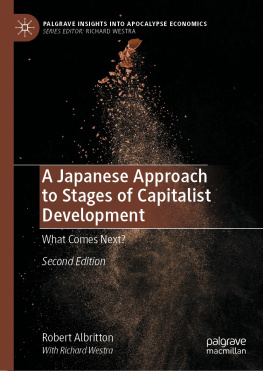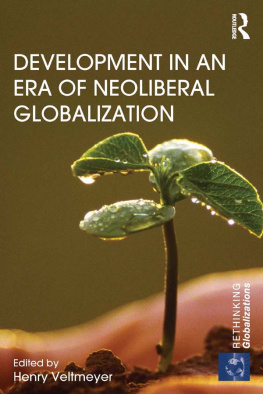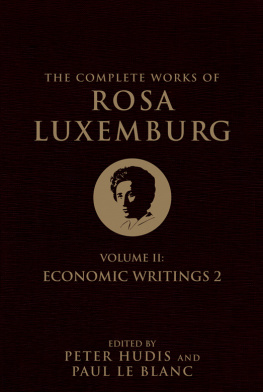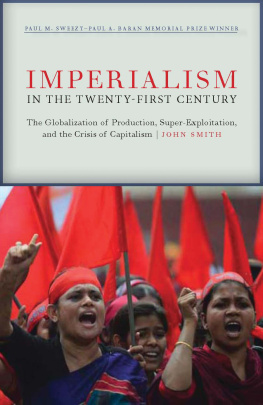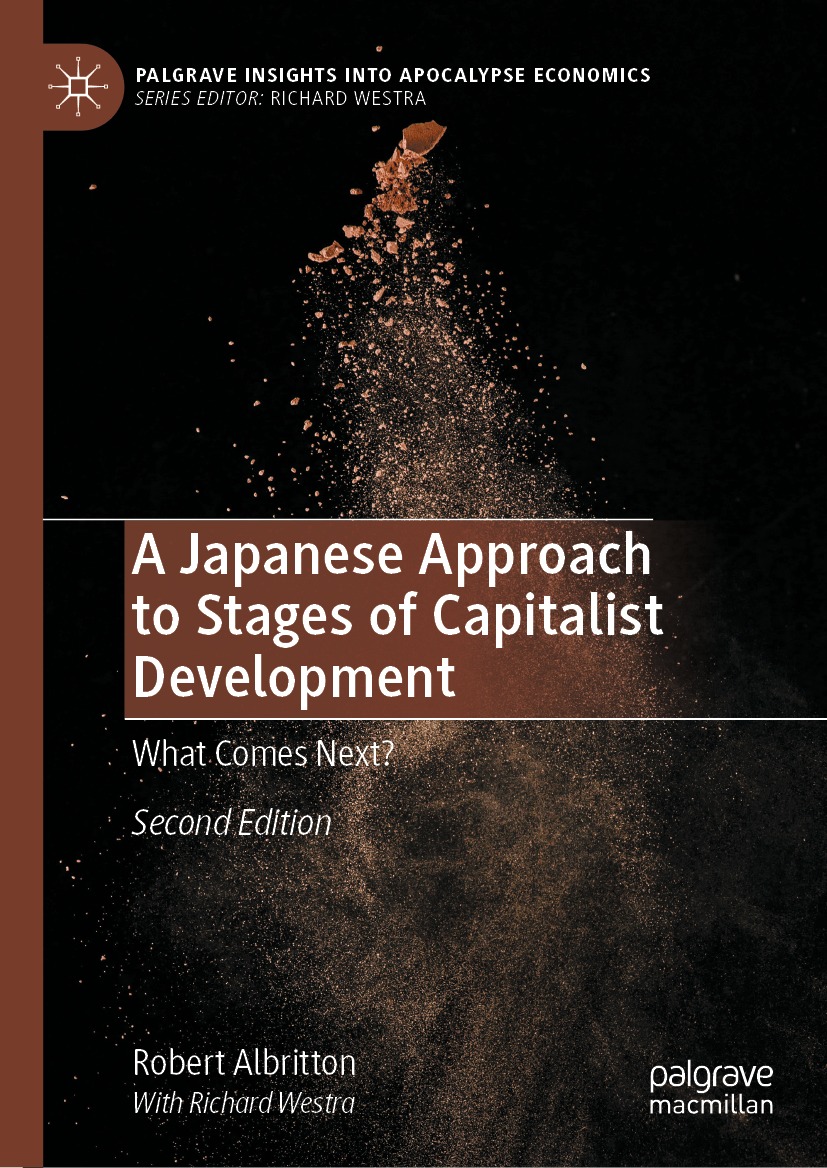Palgrave Insights into Apocalypse Economics
Series Editor
Richard Westra
Institute of Political Science, University of Opole, Poland
Center for Macau Studies, University of Macau, Macau, China
This series is set to become the lodestone for critical Marxist and related Left scholarship on the raft of apocalyptic tendencies enveloping the global economy and society. Its working premise is that neoliberal policies from the 1980s not only failed to rejuvenate capitalist prosperity lost with the demise of the post-Second World War golden age economy but in fact have generated a widening spectrum of pathologies that threaten humanity itself. At the most fundamental level the series cultivates state of the art critical political economic analysis of the crises, recessionary, deflationary and austerity conditions that have beset the world economy since the global meltdown of 20082009. However, though centered on work that critically explores global propensities for devastating financial convulsions, ever-widening inequalities and economic marginalisation due to information technologies, robotised production and low wage outsourcing, it seeks to draw on exacerbating factors such as climate change and global environmental despoliation, corrupted food systems and land-grabbing, rampant militarism, cyber crime and terrorism, all together which defy mainstream economics and conventional political policy solutions.
For critical Marxist and related Left scholars the series offers a non-sectarian outlet for academic work that is hard-hitting, inter/trans-disciplinary and multiperspectival. Its readership draws in academics, researchers, students, progressive governmental and non-governmental actors and the academically-informed public.
More information about this series at https://link.springer.com/bookseries/15867
Robert Albritton
A Japanese Approach to Stages of Capitalist Development
What Comes Next?
2nd ed. 2022
With Richard Westra

Logo of the publisher
Robert Albritton
Department of Political Science, York University, Toronto, ON, Canada
ISSN 2523-8108 e-ISSN 2523-8116
Palgrave Insights into Apocalypse Economics
ISBN 978-3-030-99036-7 e-ISBN 978-3-030-99037-4
https://doi.org/10.1007/978-3-030-99037-4
The Editor(s) (if applicable) and The Author(s), under exclusive license to Springer Nature Switzerland AG 1991, 2022
This work is subject to copyright. All rights are solely and exclusively licensed by the Publisher, whether the whole or part of the material is concerned, specifically the rights of translation, reprinting, reuse of illustrations, recitation, broadcasting, reproduction on microfilms or in any other physical way, and transmission or information storage and retrieval, electronic adaptation, computer software, or by similar or dissimilar methodology now known or hereafter developed.
The use of general descriptive names, registered names, trademarks, service marks, etc. in this publication does not imply, even in the absence of a specific statement, that such names are exempt from the relevant protective laws and regulations and therefore free for general use.
The publisher, the authors, and the editors are safe to assume that the advice and information in this book are believed to be true and accurate at the date of publication. Neither the publisher nor the authors or the editors give a warranty, expressed or implied, with respect to the material contained herein or for any errors or omissions that may have been made. The publisher remains neutral with regard to jurisdictional claims in published maps and institutional affiliations.
Cover illustration: Dina Belenko/Alamy Stock Photo
This Palgrave Macmillan imprint is published by the registered company Springer Nature Switzerland AG
The registered company address is: Gewerbestrasse 11, 6330 Cham, Switzerland
Dedicated with gratitude to
Thomas T. Sekine
Our brilliant friend, colleague, and mentor
November 22, 1933January 16, 2022
Preface
For readers, the role of Marxs Capital in grounding the study of capitalism across its history, including into the present, may seem an arcane exercise. Arguably, however, the power of Marxs thinking hinges upon the understanding of what his Capital intended to accomplish. It is this that leads those interested in Marx and Marxism to debates over the significance of Capital in Marxs vast corpus.
In this spirit, Japanese Marxian economist Kozo Uno produced a major re-working and refining of Marxs Capital. Unos work, in turn, was further developed by his student Thomas Sekine. Sekines important contribution got to the bottom of one of the biggest questions haunting Capital, that of the place of dialectics in Marxs theorizing in Capital. Sekines work draws out the homologous structuring of Capital in three doctrines akin to G. W. F. Hegels Logic which Marx praises as a major influence upon him. Sekine also elaborated, where needed, upon the mathematical formulations of key aspects of Marxs economic theory in Capital utilizing calculus and the margin principle. This enabled Sekine to clearly and robustly respond to the many spurious critiques heaped upon Capital from neoclassical economists and those Marxist economists mesmerized by neoclassical subterfuge. Sekine, along with his students and his colleagues at York University in Toronto, and his friends in Japan, have greatly expanded on other elements of Unos work as well.
This expansion has included developing Unos thought on levels of analysis in Marxian political economy. It is precisely that question which empowers us to begin thinking about how to apply Marxs formulations in Capital to deal with political economic changes Marx could hardly foresee. Albrittons first edition of this book entitled A Japanese Approach to Stages of Capitalist Development, published in 1991, took a large step in addressing that difficult question. The first edition of the book developed Uno and Sekines work on stage theory and levels of analysis in original ways. In particular, while Uno theorized stages of capitalism in terms of the way the logic of capital is supported by state policy in each stage, Albritton theorized stages more broadly by exploring stages of capitalism as relatively coherent structures of economic, ideological, legal, and political practices. Even the economic logic of capital captured in the theory of a purely capitalist society had to be theorized in each stage, Albritton maintained, according to how that logic is refracted under the specific constraints capital faces in managing the production of stage-specific use-values. Albritton was also the first scholar working in the Unoist tradition to theorize a fourth stage of capitalism. Uno theorized three stagesmercantilism, liberalism and imperialismand believed the latter to be the final stage of capitalism. Uno came to that conclusion based on the one hand, on the fact of capitalism worldwide being put on the defensive following the Soviet revolution. On the other hand, Uno thought that given the extent to which the logic of capital was compromised in the stage of imperialism by tendencies of capital towards monopolization and the extra-market interferences of an enlarging imperialist state footprint, it would be difficult for capital and the law of value to regain its vigour. Yet, for Albritton, while the fourth stage of capitalism he theorizes, which emerged in the period following World War II, certainly brought to bear extensive superstructural support for accumulation as capital itself became more organized in its attempt to govern market outcomes, the law of value continued to evidence sufficient vigour. That is, unlike in the Soviet Union where markets were replaced, in advanced capitalist economies including the U.S., from which the stage structures of accumulation are abstracted, consumerism as a stage never completely suppresses capitalist market forces.

